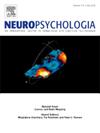失语症患者的命名练习效果和不一致性与治疗结果相关。
IF 2
3区 心理学
Q3 BEHAVIORAL SCIENCES
引用次数: 0
摘要
背景和目的:语言表现的个体差异被认为是慢性失语症治疗结果的一个相关因素。然而,语言变异的本质及其对治疗成功的影响程度仍然知之甚少。在这项研究中,我们试图(1)评估与命名变异性、练习效果和基于项目的不一致性相关的个人和项目层面的因素,(2)确定失语症患者在基线和治疗结果时的个体内部命名变异性、练习效果和基于项目的不一致性之间的关系,以及(3)确定治疗对命名反应变异性和一致性变化的影响。方法:78名单侧左半球中风后慢性失语症患者(中风后6个月)在接受6周词汇加工治疗前连续两天完成了两次费城命名测试(PNT)。对于每个参与者,我们计算了基线时两个PNT之间正确命名项目的绝对差异(我们称之为“命名变异性”)和基线时从第一个PNT到第二个PNT的变化(我们称之为“命名练习效应”)。此外,我们将参与者对两个pnt上每个项目的命名反应分类为正确-正确,一正确和不正确-不正确。一个正确的回答反映了在两个基线pnt中对同一项目的个人内部命名不一致(我们称之为“命名不一致”)。我们评估了命名变异性、练习效果、不一致性、个人层面因素(失语症严重程度、失语症类型、言语失用症、中风严重程度、年龄、教育程度)、项目层面因素(词频、长度、语音邻域密度)、治疗反应(治疗前后正确反应率的变化)之间的关系。结果:78名参与者在两个基线pnt上的正确命名反应率无统计学差异;因此,没有显著的练习效果。然而,可变性和不一致性是常见的,在两个基线pnt之间,正确命名的项目差异高达17%,相同项目一次正确命名一次错误命名的差异高达45%。命名变异性与失语症类型和严重程度显著相关,不一致性与失语症类型、严重程度、言语失用的存在和目标词频相关。虽然命名变异性与治疗结果无关,但实践效果和基线的不一致性与治疗结果显著相关,并分别解释了治疗前后正确反应率变化的36%和6%的差异。通过5倍交叉验证,实践效应和不一致性对预测反应和实际反应的决定系数(R2)分别为0.32和0。治疗后,命名的可变性和不一致性显著降低,被一致正确命名的项目的增加所抵消。讨论:我们观察到,与失语症严重程度无关,练习效果较强或基线不一致的参与者的命名改善程度高于练习效果较小或基线命名一致的参与者。然而,新数据预测治疗结果的通用性在实践效果和不一致性方面较弱。在治疗后,参与者产生了更少的变化和更一致的反应,表明治疗导致词汇-语义检索过程的全面加强。本文章由计算机程序翻译,如有差异,请以英文原文为准。
Naming practice effects and inconsistencies relate to treatment outcome in people with aphasia
Background and aims
Intra-individual variability in language performance has been proposed as a factor associated with treatment outcomes in chronic aphasia. However, the nature of linguistic variability and the degree to which it informs therapeutic success remains poorly understood. In this study, we sought to (1) assess person- and item-level factors associated with naming variability, practice effects, and item-based inconsistencies, (2) determine the relation between intra-individual naming variability, practice effects, and item-based inconsistencies at baseline and treatment outcome in aphasia, and (3) determine the treatment impact on the change in variability and consistency of naming responses.
Method
Seventy-eight participants with chronic (>6 months post-stroke) aphasia after a unilateral left-hemisphere stroke completed the Philadelphia Naming Test (PNT) twice over two consecutive days prior (at baseline) to receiving six weeks of lexical processing treatment. For each participant, we calculated the absolute difference in correctly named items between the two PNTs at baseline (which we termed “naming variability”) and the change from the first to second PNT at baseline (which we termed “naming practice effect”). Further, we classified participants’ naming responses for each item on the two PNTs as correct-correct, one-correct, and incorrect-incorrect. One-correct responses reflected intra-individual naming inconsistencies for the same item across the two baseline PNTs (which we termed “naming inconsistencies”). We assessed the relationship between naming variability, practice effects, inconsistencies, and person-level factors (aphasia severity, aphasia type, apraxia of speech, stroke severity, age, education), item-level factors (word frequency, length, phonological neighborhood density), treatment response (the change in the rate of correct responses from before to after treatment).
Results
The rate of correct naming responses on the two baseline PNTs did not statistically differ across the 78 participants; thus, there was no significant practice effect. However, variability and inconsistencies were common, with a difference of up to 17 % in correctly named items and up to 45 % of the same items named once correctly and once incorrectly between the two baseline PNTs. Naming variability was significantly related to aphasia type and severity, and inconsistencies were related to aphasia type, severity, the presence of apraxia of speech, and target word frequency. While naming variability was not associated with treatment outcome, practice effects and inconsistencies at baseline were significantly associated with treatment outcome and explained 36 % and 6 % of the variance in the change in the rate of correct responses from before to after treatment, respectively. Using 5-fold cross-validation, practice effects and inconsistencies had a coefficient of determination (R2) of 0.32 and 0, respectively, for predicted vs actual responses. After treatment, naming variability and inconsistencies significantly decreased, counterbalanced by an increase in consistently correctly named items.
Discussion
We observed greater treated naming improvement in participants with stronger practice effects or more inconsistencies at baseline than in participants with smaller practice effects or more consistent naming at baseline, independent of aphasia severity. However, the generalizability to new data to predict treatment outcomes was weak for practice effects and poor for inconsistencies. After treatment, participants produced less variable and more consistent responses, indicating that treatment led to an overall strengthening of lexical-semantic retrieval processes.
求助全文
通过发布文献求助,成功后即可免费获取论文全文。
去求助
来源期刊

Neuropsychologia
医学-行为科学
CiteScore
5.10
自引率
3.80%
发文量
228
审稿时长
4 months
期刊介绍:
Neuropsychologia is an international interdisciplinary journal devoted to experimental and theoretical contributions that advance understanding of human cognition and behavior from a neuroscience perspective. The journal will consider for publication studies that link brain function with cognitive processes, including attention and awareness, action and motor control, executive functions and cognitive control, memory, language, and emotion and social cognition.
 求助内容:
求助内容: 应助结果提醒方式:
应助结果提醒方式:


